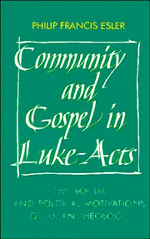Book contents
- Frontmatter
- Contents
- Acknowledgements
- List of abbreviations
- 1 The socio-redaction criticism of Luke–Acts
- 2 The community
- 3 Sectarian strategies
- 4 Table-fellowship
- 5 The law
- 6 The Temple
- 7 The poor and the rich
- 8 Rome and the ancestral theme
- Epilogue: community and Gospel
- Notes
- Index of biblical references
- Index of secondary authors
3 - Sectarian strategies
Published online by Cambridge University Press: 10 January 2011
- Frontmatter
- Contents
- Acknowledgements
- List of abbreviations
- 1 The socio-redaction criticism of Luke–Acts
- 2 The community
- 3 Sectarian strategies
- 4 Table-fellowship
- 5 The law
- 6 The Temple
- 7 The poor and the rich
- 8 Rome and the ancestral theme
- Epilogue: community and Gospel
- Notes
- Index of biblical references
- Index of secondary authors
Summary
Introduction
There is a growing awareness today of the benefits which flow to New Testament studies from viewing early Christianity as a sectarian movement in some way comparable to other such movements, both from our own time and from previous historical periods, whose beliefs and practices have been investigated by historians, anthropologists and sociologists. This is, however, a fairly recent development in New Testament scholarship. In fact, the palm for the first methodologically conscious and detailed attempt to apply contemporary sociological studies of sectarianism to early Christianity goes to Robin Scroggs for an essay published as late as 1975. Since then some New Testament scholars have begun using sectarian perspectives with growing sophistication and effect. Several other writers have picked up the sectarian theme, even if their appropriation of the relevant sociological insights is far more tentative.
Given this continuing hesitation as to the need, and uncertainty as to the means, for studying early Christianity as a sect, it is necessary to begin this treatment of the sectarian strategies in Luke–Acts with an outline of the sociological ideas which will be employed. The broad line argued in this book is that Luke's unique presentation of his material constitutes a symbolic universe designed to legitimate for the Christians of his community the new movement of which they were members.
- Type
- Chapter
- Information
- Community and Gospel in Luke-ActsThe Social and Political Motivations of Lucan Theology, pp. 46 - 70Publisher: Cambridge University PressPrint publication year: 1987



